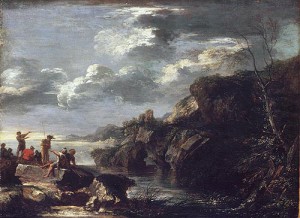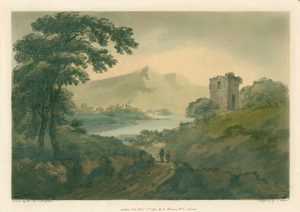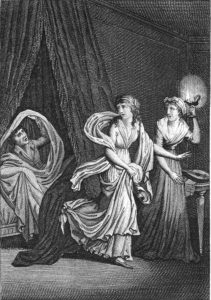Excerpts from Edmund Burke’s, A Philosophical Enquiry into the Origin of Our Ideas of the Sublime and the Beautiful, 1767.
[The Sublime]
Whatever is fitted in any sort to excite the ideas of pain and danger, that is to say, whatever is in any sort terrible, or is conversant about terrible objects, or operates in a manner analogous to terror, is the source of the sublime, that is, it is productive of the strongest emotion which the mind is capable of feeling. I say the strongest emotion, because I am satisfied the ideas of pain are much more powerful than those which enter on the part of pleasure. . . [but] When danger or pain press too nearly, they are incapable of giving any delight, and are simply terrible; but at certain distances, and with certain modifications, they may be, and they are delightful, as we every day experience.
[Of the Passion Caused by the Sublime]
The passion caused by the great and sublime in nature, when those causes operate most powerfully, is astonishment; and astonishment is that state of the soul, in which all its motions are suspended, with some degree of horror. . . Hence arises the great power of the sublime, that far from being produced by them, it anticipates our reasonings, and hurries us on by an irresistible force. Astonishment, as I have said, is the effect of the sublime in its highest degree, the inferior effects are admiration, reverence, and respect.
[Terror]
No passion so effectually robs the mind of all its powers of acting and reasoning as fear. For fear being an apprehension of pain or death, it operates in a manner that resembles actual pain. Whatever therefore is terrible, with regard to sight, is sublime too.
[Power]
The power which arises from institution in kings and commanders, has the same connection with terror. Sovereigns are frequently addressed with the title of dread majesty. And it may be observed, that young persons little acquainted with the world, and who have not been used to approach men in power, are commonly struck with an awe which takes away the free use of their faculty.
[The Sublime and Beautiful Compared]
On closing this general view of beauty, it naturally occurs, that we should compare it with the sublime; and in this comparison there appears a remarkable contrast. For sublime objects are vast in their dimensions, beautiful ones comparatively small, beauty should be smooth and polished . . . beauty should not be obscure, the great ought to be dark and gloomy; beauty should be light and delicate; the great ought to be solid, and even massive. They are indeed ideas of a very different nature, one being founded on pain, the other on pleasure.
Excerpts from William Gilpin’s Three Essays: On Picturesque Beauty; On Picturesque Travel; and On Sketching Landscape, 1792.
[Picturesque beauty] we pursue through the scenery of nature; and examine it by the rules of painting. We seek it among all the ingredients of landscape — trees — rocks — broken grounds — woods — rivers — lakes — plains — vallies — mountains — and distances. These objects in themselves produce infinite variety. No two rocks, or trees are exactly the same. They are varies, a second time, by combination, and almost as much, a third time, by different lights, and shades, and other aereal effects.
and
But among all the objects of art, the picturesque eye is perhaps most inquisitive after the elegant relics of ancient architecture; the ruined tower, the gothic arch, the remains of castles and abbeys. These are the richest legacies of art. They are consecrated by time; and almost deserve the veneration we pay to the works of nature itself.
Thus universal are the objects of picturesque travel. We pursue beauty in every shape; through nature, through art; and all its various arrangements in form, and colour; admiring it in the grandest objects, and not rejecting it in the humblest.
. . . The first source of amusement to the picturesque traveller, is the pursuit of his object — the expectation of new scenes continuing opening, and arising to his view. We suppose the country to be unexplored . . . Every distant horizon promises something new; and with this pleasing expectation we follow nature through all her walks. We pursue her from hill to dale; and hunt after those various beauties, with which she everywhere abounds.
Excerpt from Anna Laetitia Aikin (later Barbauld) and John Aikin, “On the Pleasure Derived from Objects of Terror,” 1773
… [T]he apparent delight with which we dwell upon objects of pure terror, where our moral feelings are not in the least concerned, and no passion seems to be excited but the depressing one of fear, is a paradox of the heart. …
The reality of this source of pleasure seems evident from daily observation. The greediness with which the tales of ghosts and goblins, of murders, earthquakes, fires, shipwrecks, and all the most terrible disasters attending human life, are devoured by every ear, must have been generally remarked. Tragedy, the most favourite work of fiction, has taken a full share of those scenes. …
How are we then to account for the pleasure derived from such objects? I have often been led to imagine that there is a deception in these cases; and that the avidity with which we attend is not a proof of our receiving real pleasure. The pain of suspense, and the irresistible desire of satisfying curiosity, when once raised, for our eagerness to go quite through an adventure, though we suffer actual pain during the whole course of it. We rather choose to suffer the smart pang of a violent emotion than the uneasy craving of an unsatisfied desire. That this principle, in many instances, may involuntarily carry us through what we dislike, I am convinced from experience. This is the impulse which renders the poorest and most insipid narrative interesting when once we get fairly into it; and I have frequently felt it with regard to our modern novels, which, if lying on my table, and taken up in an idle hour, have led me through the most tedious and disgusting pages, while, like Pistol eating his leek, I have swallowed and execrated to the end. And it will not only force us through dullness, but through actual torture—through the relation of a Damien’s execution, or an inquisitor’s act of faith. When children, therefore, listen with pale and mute attention to the frightful stories of apparitions, we are not, perhaps, to imagine that they are in a state of enjoyment, any more than the poor bird which is dropping into the mouth of the rattlesnake—they are chained by the ears, and fascinated by curiosity. This solution, however, does not satisfy me with respect to the well-wrought scenes of artificial terror which are formed by a sublime and vigorous imagination. Here, though we know before-hand what to expect, we enter into them with eagerness, in quest of a pleasure already experienced. This is the pleasure constantly attached to the excitement of surprise from new and wonderful objects. A strange and unexpected event awakens the mind, and keeps it on the stretch; and where the agency of invisible beings is introduced, of “forms unseen, and mightier far than we,” our imagination, darting forth, explores with rapture the new world which is laid open to its view, and rejoices in the expansion of its powers. Passion and fancy cooperating elevate the soul to its highest pitch; and the pain of terror is lost in amazement.
Hence the more wild, fanciful, and extraordinary are the circumstance of a scene of horror, the more pleasure we receive from it; and where they are too near common nature, though violently borne by curiosity through the adventure, we cannot repeat it or reflect on it, without an overbalance of pain. In the Arabian Nights are many most striking examples of the terrible joined with the marvellous: the story of Alladin, and the travels of Sinbad, are particularly excellent. The Castle of Otranto is a very spirited modern attempt upon the same plan of mixed terror, adapted to the model of Gothic romance. The best conceived, and most strongly worked-up scene of mere natural horror that I recollect, is in Smollett’s Ferdinand Count Fathom; where the hero, entertained in a lone house in a forest, finds a corpse just slaughtered in the room where he is sent to sleep, and the door of which is locked upon him.


